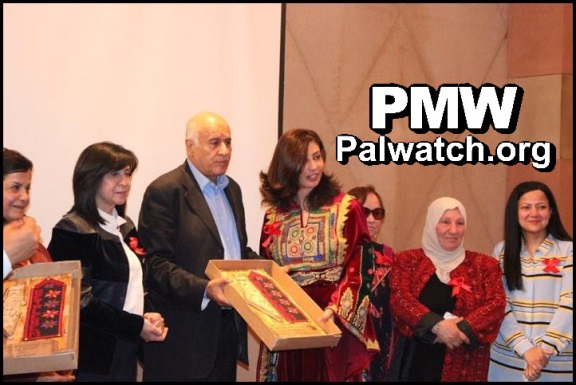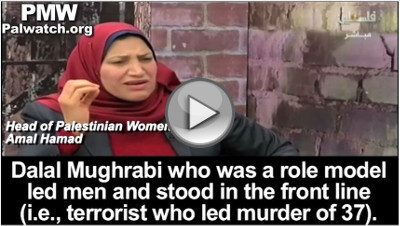Fatah: Kill 37 Israelis, become a role model for Palestinian women
Fatah leaders:
Role model for Palestinian women
is terrorist Dalal Mughrabi
who led murder of 37, including 12 children
- Secretary of Fatah Central Committee: “The women of Palestine draw from the giving and struggle of the first female Martyrs of Palestine, and prime among them Dalal Mughrabi and Laila Khaled”
- Fatah Central Committee member: “[Mughrabi was] a daughter of the land who scattered her soul on the soil of the land of peace and constitutes for us a Palestinian school for the supreme love of the homeland”
“The lady of complete giving for the freedom of the land and man. May her soul rest in our skies, a true rainbow of freedom”
- Fatah Central Committee member: “[Her operation] spread the spirit of victory in the hearts of the Palestinians and struck the Israeli occupation like lightning... [Her] “soul is constantly floating in the skies of Palestine”
- PA National Security Forces: Mughrabi is “the bride of Jaffa”
- Head of Palestinian Women’s Union on occasion of International Women’s Day: “She killed as many as she killed"
Nan Jacques Zilberdik
On the March 11 anniversary of the most lethal attack in Israel’s history, the Coastal Road massacre in which 37 civilians were murdered, among them 12 children, members of Fatah’s Central Committee praised the female terrorist who led the attack, Dalal Mughrabi, as a role model for Palestinians. As the anniversary of the attack coincides with International Women’s Day on March 8, some Fatah leaders emphasized the female terrorist’s importance as an example for women in particular.
Fatah Central Committee Secretary Jibril Rajoub presents honorary plaques at the ceremony |
At a ceremony honoring women “fighters” and “creators” held under the auspices of Jibril Rajoub, Secretary of Fatah’s Central Committee, who Palestinian Media Watch has shown is a blatant terror promoter, Rajoub praised terrorist Mughrabi as “prime among” female “Martyrs,” and suggested that Palestinian women of today let themselves be inspired by Mughrabi and the female plane hijacker Laila Khaled:
“[Rajoub] noted that the women of Palestine draw from the giving and struggle of the first female Martyrs of Palestine, and prime among them Dalal Mughrabi and Laila Khaled, who succeeded in raising the Palestinian voice high and sounding it for the whole world.”
[PNN, independent Palestinian news agency, March 12, 2017]
On the occasion of International Women’s Day, the head of Palestinian Women’s Union, and former Fatah Central Committee member Amal Hamad seconded this. She stated on PA TV that Dalal Mughrabi was “a role model” who “excelled in her leadership”:
Head of Palestinian Women’s Union Amal Hamad: “Dalal Mughrabi who was a role model led men and stood in the front line. Dalal established a state inside a bus, and waved a flag over the bus. She killed as many as she killed from among the occupation’s soldiers, not from among civilians (sic., all of the victims were civilians). She excelled in her leadership, her pioneering and her faith.”
[Official PA TV, I Call You, March 6, 2017]
On the same program, the director of a women’s research center agreed on Palestinian women’s central role, pointing out three female terrorists:
PFLP political bureau member and Director of the Women’s Research Center Maryam Abu Daqqa: “The Palestinian women created a triangle of horror: Laila Khaled from the air, Shadia Abu Ghazaleh from the land and Dalal Mughrabi from the sea.”
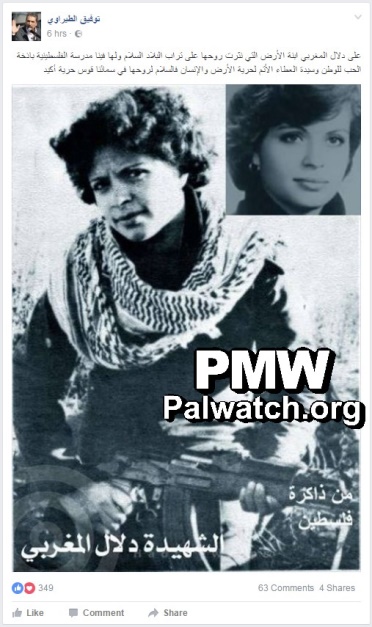
Fatah Central Committee member Tawfiq Tirawi presented Mughrabi as an example to follow, “a school”, praised her for “scattering her soul on the soil,” and posted a photo of her holding an assault rifle:
“Concerning Dalal Mughrabi, a daughter of the land who scattered her soul on the soil of the land of peace and constitutes for us a Palestinian school for the supreme love of the homeland. The lady of complete giving for the freedom of the land and man. May her soul rest in our skies, a true rainbow of freedom.”
[Facebook page of Tawfiq Tirawi, March 11, 2017]
Fatah Central Committee member Abbas Zaki also venerated Dalal Mughrabi on occasion of her attack. He said her attack “spread the spirit of victory in the hearts of the Palestinians and struck the Israeli occupation like lightning.” He added that Mughrabi had become “a legend” and that her “soul is constantly floating in the skies of Palestine.” [Website of Fatah’s Information and Culture Commission, March 11, 2017]
Fatah’s glorification of the Coastal Road attack and murderer Dalal Mughrabi is not new. PMW has documented that the Palestinian Authority and Fatah have turned Mughrabi into a role model for society. Earlier this year, Fatah included huge posters of Mughrabi alongside posters of chairman Abbas at a military parade:
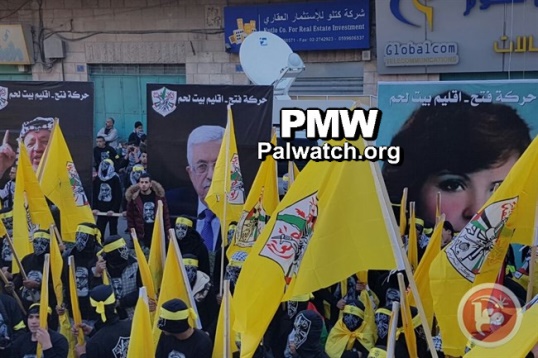 |
Posters of Dalal Mughrabi, PA Chairman Mahmoud Abbas, and Yasser Arafat [Ma’an, independent Palestinian news agency, Jan. 1, 2017] |
At a Fatah event in honor of Mughrabi and her attack, the stage was adorned with two large photos of Mughrabi next to the Fatah logo. Speaking at the event, Fatah Central Committee member Abbas Zaki called the terrorist murderer a “Martyr”, “fighter,” and “one of the most famous Palestinian self-sacrificing fighters.” [Facebook page of Abbas Zaki, March 12, 2017]
A PA official, District Governor of Ramallah and El-Bireh Dr. Laila Ghannam, likewise spoke at the ”eulogy ceremony for Martyr Dalal Mughrabi.” [Official Facebook page of Ramallah & Al-Bireh Governorate, March 11, 2017]
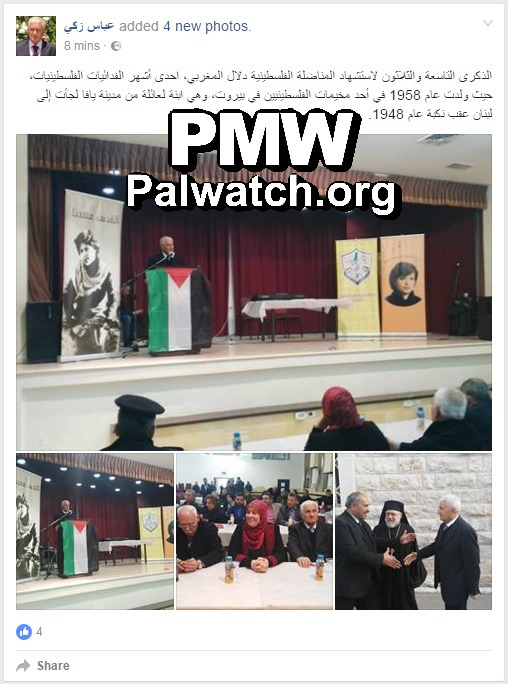
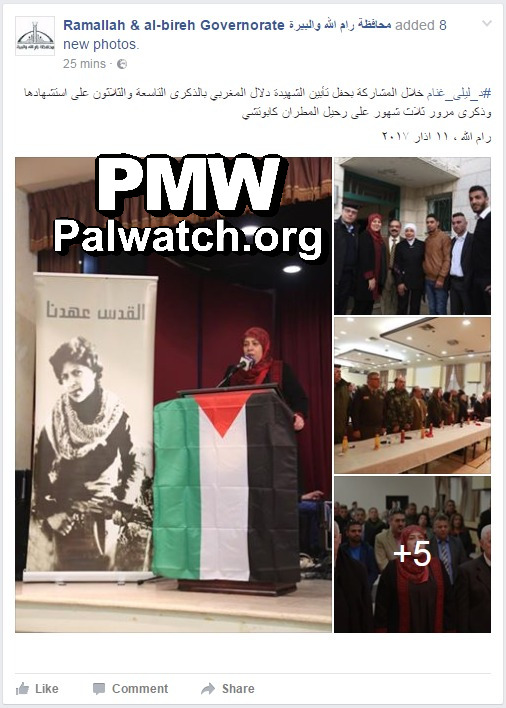
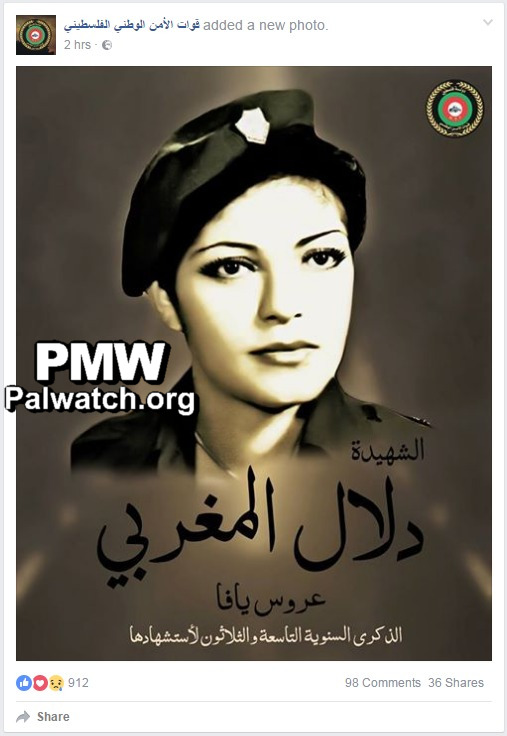
“The bride of Palestine” is how a branch of Fatah in Gaza referred to the murderer, posting her photo and her “will” on Facebook, encouraging violence against Israel:
Text on image: “Fatah Movement - East Gaza branch
Information Commission
The will of the bride of 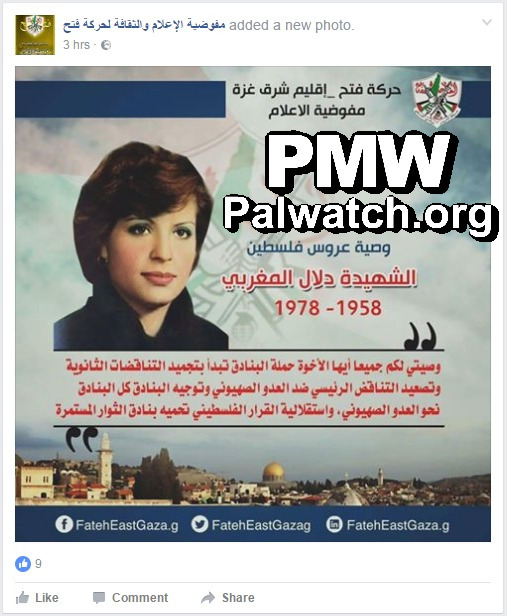 Palestine
Palestine
 Palestine
PalestineMartyr (Shahida) Dalal Mughrabi
1958-1978
‘My will to all of you, O my rifle-bearing brothers, begins with freezing the secondary conflicts and intensifying the main conflict against the Zionist enemy and turning the rifles - all of the rifles - toward the Zionist enemy. This is because the independence of the Palestinian decision-making is defended by the rifles of the revolutionaries [who shoot] continuously.’”
[Facebook page of Fatah Information and Culture Commission, March 11, 2017]
Fatah’s Information and Culture Commission posted a long but untrue description of the attack and its results on its website, claiming that the victims were all Israeli soldiers when they were in fact all civilians. (See full article below). The attack was praised as “a quality and brave operation” that was able to “strike the Zionist occupation in the heart of its capital,” and the attackers were “10 self-sacrificing fighters... [and] Palestinian hero Dalal Mughrabi.” The terrorists went ashore “successfully” on the Israeli coast because “Israel did not expect that the Palestinians would have the courage.” [Website of Fatah’s Information and Culture Commission, March 11, 2017]
An article in the official PA daily, likewise full of “alternative facts” denying that all victims were civilians, presented terrorist Mughrabi as brave and loyal:
“She was known for her courage, her high national sentiment, and her devotion to Palestine and Fatah.” (See full article below).
[Official PA daily Al-Hayat Al-Jadida, March 11, 2017]
Fatah wrote on its official Facebook page that Dalal Mughrabi is “the legend that will not die.”
[Official Fatah Facebook page, March 12, 2017]
The following are longer excerpts of the statements glorifying terrorist murderer Dalal Mughrabi:
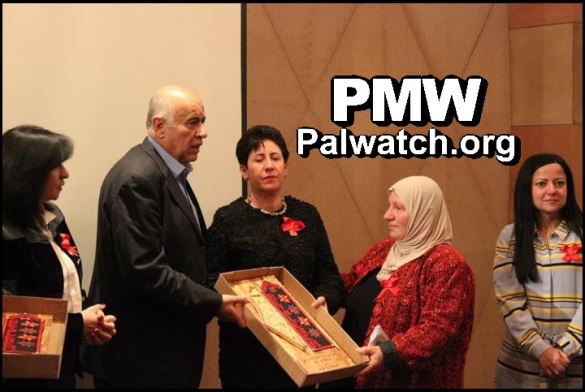 Headline: “PNN in a video: ‘Female Stars of Bethlehem’ - central honor ceremony for female fighters and creators in honor of March 8 (i.e., International Women’s Day)”
Headline: “PNN in a video: ‘Female Stars of Bethlehem’ - central honor ceremony for female fighters and creators in honor of March 8 (i.e., International Women’s Day)”“In a large ceremony under the auspices of [Fatah Central Committee Secretary] Jibril Rajoub, the Bethlehem District and its Social Solidarity Committee launched the first annual ‘Female Stars of Bethlehem Ceremony 2017’ honor ceremony, through which a group of female fighters alongside female creators who excel in their professional and daily lives will be honored every year...
Rajoub noted that the honoring of the five fighters and 10 creators is part of the ongoing Palestinian national struggle. He noted that the women of Palestine draw from the giving and struggle of the first female Martyrs (Shahids) of Palestine, and prime among them Dalal Mughrabi (i.e., terrorist who led murder of 37, 12 of them children) and Laila Khaled (i.e., terrorist who took part in airplane hijackings), who succeeded in raising the Palestinian voice high and sounding it for the whole world.”
[PNN, independent Palestinian news agency, March 12, 2017]
The article includes pictures of Fatah Central Committee Secretary Jibril Rajoub presenting honorary plaques at the ceremony. The plaques feature the PA map of “Palestine” that presents all of Israel as “Palestine” together with the PA areas.
Jibril Rajoub also holds the following positions: Head of the Supreme Council for Sport and Youth Affairs, Chairman of the Palestinian Football Association, Chairman of the Palestine Olympic Committee, and Chairman of the Palestinian Scout Association (PSA).
Laila Khaled - PFLP terrorist who participated in the hijacking of TWA flight 840 on Aug. 29, 1969 from Rome to Athens and the hijacking of El Al flight 219 on Sept. 6, 1970 from Amsterdam to New York. The second hijacking was averted by the pilot and security personnel on board. They shot Khaled’s accomplice, Patrick Argüello, who had murdered one of the flight attendants. Khaled was overpowered and the plane landed in London where Khaled was handed over and held by British police until she was exchanged on Oct. 1, 1970 with hostages held by the PFLP.
Image and text posted on the Facebook page of Fatah Central Committee member and Fatah Commissioner of Popular Organizations Tawfiq Tirawi
Posted text: “Concerning Dalal Mughrabi (i.e., terrorist who led murder of 37, 12 of them children), a daughter of the land who scattered her soul on the soil of the land of peace and constitutes for us a Palestinian school for the supreme love of the homeland. The lady of complete giving for the freedom of the land and man. May her soul rest in our skies, a true rainbow of freedom.”
Text on bottom of image: “From the memory of Palestine
Martyr (Shahida) Dalal Mughrabi”
[Facebook page of Tawfiq Tirawi, March 11, 2017]
Images and text posted on the Facebook page of Fatah Central Committee member and Fatah Commissioner for Arab and China Relations Abbas Zaki
Text on sign next to Zaki featuring Mughrabi’s picture: “Jerusalem is our oath”
Posted text: “The 39th anniversary of the death as a Martyr (Shahid) of Palestinian fighter Dalal Mughrabi (i.e., terrorist who led murder of 37, 12 of them children), one of the most famous Palestinian self-sacrificing fighters (Fida’iya). She was born in 1958 in one of the refugee camps in Beirut, and was the daughter of a family from the city of Jaffa that escaped to Lebanon due to the Nakba (i.e., “the catastrophe,” Palestinian term for the establishment of the State of Israel) of 1948.”
[Facebook page of Abbas Zaki, March 12, 2017]
Posted text: “[District Governor of Ramallah and El-Bireh] Dr. Laila Ghannam during her participation in the eulogy ceremony for Martyr (Shahida) Dalal Mughrabi (i.e., terrorist who led murder of 37, 12 of them children) on the 39th memorial day of her death as a Martyr, and for the passage of three months since the passing of [former Greek Catholic] Archbishop [of Jerusalem Hilarion] Capucci
Ramallah, March 11, 2017”
Text on sign: “Jerusalem is our oath”
[Official Facebook page of Ramallah & Al-Bireh Governorate, March 11, 2017]
Headline: “Zaki on the 39th anniversary of the operation: Dalal Mughrabi is a quality turning point in the history of the Palestinian struggle”
“Fatah Movement Central Committee member and the movement’s Commissioner for Arab and China Relations Abbas Zaki compared the Martyr (Shahid) Kamal Adwan operation (i.e., the Coastal Road Massacre, 37 murdered, 12 of them children), which was led by Dalal Mughrabi, to the Karameh battle (see note below -Ed.). This is because it constituted an additional new beginning of the Palestinian resistance due to its deep influence, as it spread the spirit of victory in the hearts of the Palestinians and struck the Israeli occupation like lightning.
Zaki said in an interview with Radio Mawtini today, Saturday [March 11, 2017]: ‘On the 39th anniversary of the death as a Martyr of Palestinian fighter Dalal Mughrabi, we recall the planner of the operation, Martyr commander Abu Jihad (i.e., former head of the PLO terror organization’s military wing), who turned Martyr fighter Dalal into a legend who surpassed all of the military ranks and into a turning point in the military operations against the occupation...’
Zaki said: ‘The occupation is still holding the body of Martyr Dalal Mughrabi for the last 39 years due to its fear of her memory (sic., Mughrabi’s body was to be handed over to Hezbollah in Lebanon in 2008, but was found to have been lost due to subterranean erosion in the cemetery for terrorists and enemy soldiers).’ He added that the occupation state of ‘Israel’ is the only one that is losing by holding the bodies of the Martyrs.
He emphasized that [Dalal’s] soul is constantly floating in the skies of Palestine, and said: ‘This occupation does not attribute any importance to religion, values, and morals.’”
[Website of Fatah’s Information and Culture Commission, March 11, 2017]
Kamal Adwan was responsible for Fatah’s terrorist operations in Israel in the early 1970’s and was a senior member of Black September. He was killed by Israeli forces in April 1973.
The Karameh battle, or Al-Karameh - On March 21, 1968, Israeli army forces attacked the town of Karameh in Jordan, where Fatah terrorists had been launching attacks on Israel. Although Israel prevailed militarily, Arafat used the event for propaganda purposes, declaring the battle a great victory that erased the disgrace of the 1967 Six Day War defeat.
Abu Jihad (Khalil Al-Wazir) was a founder of Fatah and deputy to Yasser Arafat. He headed the PLO terror organization's military wing and also planned many deadly Fatah terror attacks in the 1960’s - 1980’s. These attacks, which murdered a total of 125 Israelis, included the most lethal in Israeli history - the hijacking of a bus and killing of 37 civilians, 12 of them children.
Image posted on the Facebook page of Fatah Information and Culture Commission
The image features a photo of terrorist Dalal Mughrabi who led the murder of 37, 12 of them children. At the top right appears the Fatah logo that includes a grenade, crossed rifles, and the PA map of “Palestine” that presents all of Israel as “Palestine” together with the PA areas.
Text on image: “Fatah Movement - East Gaza branch
Information Commission
The will of the bride of Palestine
Martyr (Shahida) Dalal Mughrabi
1958-1978
‘My will to all of you, O my rifle-bearing brothers, begins with freezing the secondary conflicts and intensifying the main conflict against the Zionist enemy and turning the rifles - all of the rifles - toward the Zionist enemy. This is because the independence of the Palestinian decision-making is defended by the rifles of the revolutionaries [who shoot] continuously.’”
[Facebook page of Fatah Information and Culture Commission,
March 11, 2017]
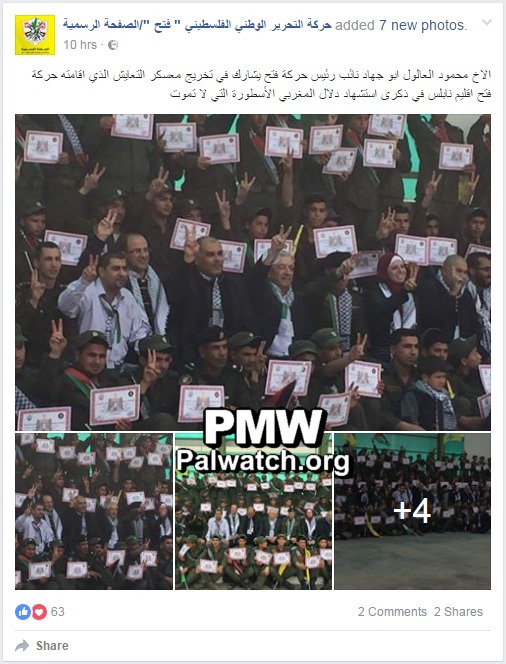
Images and text posted on the official Fatah Facebook page
Posted text: “Fatah Movement Deputy Chairman [and Fatah Central Committee member] Mahmoud Al-Aloul ‘Abu Jihad’ participates in the graduation ceremony of the Al-Ta’ayush (i.e., “Coexistence”) [Training] Camp that was held by the Nablus branch of the Fatah Movement on the anniversary of the death as a Martyr (Shahida) of Dalal Mughrabi (i.e., terrorist who led murder of 37, 12 of them children), the legend that will not die.”
[Official Fatah Facebook page, March 12, 2017]
Headline: “Dalal Mughrabi: A 20-year-old fighter who led an operation that shocked the security position of the occupation state”
“Dalal Mughrabi (i.e., terrorist who led murder of 37, 12 of them children) was a young Palestinian woman who was born in 1958 in the Sabra refugee camp, one of the refugee camps near the Lebanese capital, Beirut. She was the daughter of a family from the city of Jaffa that fled to Lebanon due to the Nakba (i.e., “the catastrophe,” the Palestinian term for the establishment of the State of Israel) of 1948...
The year 1978 was a bad year for the Palestinian revolution, as it took a number of blows and several of its military operations (i.e., terror attacks) failed. Likewise, the refugee camps in Lebanon were witness to massacres, and there was an urgent need to carry out a quality and brave operation in order to strike the Zionist occupation in the heart of its capital, and such was the Kamal Adwan operation (i.e., the Coastal Road Massacre, it did not take place in the capital of Jerusalem).
The operation was planned by Martyr (Shahid) commander Abu Jihad (i.e., former head of the PLO terror organization’s military wing who planned attacks in which 125 were murdered). It was based on disembarking on the Palestinian coast, taking control of a military bus, and traveling towards Tel Aviv in order to attack the Israeli Parliament building (sic., the Israeli Parliament is located in Jerusalem). It was a suicide operation, and nevertheless the young Palestinians vied to take part in it. At their head stood Dalal Mughrabi, 20, who was chosen as commander of the squad carrying out the operation, which was comprised of 10 self-sacrificing fighters (Fedayeen) in addition to Palestinian hero Dalal Mughrabi...
On the morning of March 11, 1978, Dalal disembarked with her suicide squad from a boat that passed opposite the Palestinian coast and with her squad got into two rubber boats, with which they reached an unpopulated area of the coast. The operation of disembarking on the coast succeeded, and they were not exposed by the Israelis, particularly because Israel did not expect that the Palestinians would have the courage to disembark on the coast in this way.
Dalal and her team succeeded in reaching the main road leading to Tel Aviv and took control of an Israeli bus and all of its soldier passengers (sic., the passengers were civilians). The bus was on its way to Tel Aviv and they took them hostage and travelled toward the city. During the trip, she and her team shot at all the Israeli cars travelling next to the bus they had taken control of, which caused hundreds of wounds (sic., over 70 were wounded) to the ranks of the occupation’s soldiers. This was particularly so because the road Dalal travelled on served military vehicles in transporting soldiers from the Zionist settlements in the suburbs to the capital of Tel Aviv (sic., the road served civilian traffic along the coast; Israel’s capital is Jerusalem).
Two hours after disembarking on the coast, and due to the many wounds [caused to] the ranks of the occupation, and after Dalal had reached the outskirts of Tel Aviv, the [Israeli] government appointed a special army team commanded by [Ehud] Barak (i.e., later served as Israeli prime minister) to stop the bus and kill or arrest all of the self-sacrificing fighters on it.
Large units of tanks, airplanes, and helicopters commanded by Barak pursued the bus, until they stopped it next to the settlement of Herzliya (sic., Herzliya is a coastal city).
A true war broke out between Dalal and her team and the Israeli occupation forces, as Dalal blew up the bus with all of its soldier passengers (sic. all the passengers were civilians), and they were all killed. Dozens of the occupation’s soldiers were killed in the operation. When Dalal and her team ran out of ammunition, Barak ordered to shoot everyone down with machine guns, and they all died as Martyrs at the site.
Dalal Mughrabi and the 11 self-sacrificing fighters (sic., 10) alongside her died as Martyrs after the occupation’s army lost approximately 30 people and more than 80 wounded, according to the numbers that were announced by the occupation forces.”
[Website of Fatah’s Information and Culture Commission, March 11, 2017]
Headline: “Today is the 39th anniversary of the death as a Martyr of Dalal Mughrabi”
“Today [March 11, 2017] is the 39th anniversary of the death as a Martyr (Shahid) of fighter Dalal Mughrabi (i.e., terrorist who led murder of 37, 12 of them children). Dalal decided to join the ranks of the Palestinian revolution and to be active in the ranks of the self-sacrificing fighters (Fedayeen) in the Fatah Movement during her studies, and she took many military courses and many classes on guerilla warfare. During [the courses] she trained with different types of weapons, and she was known for her courage, her high national sentiment, and her devotion to Palestine and Fatah.
The assassination of the three leaders Kamal Adwan, Kamal Nasser, and Abu Yusuf Al-Najjar (i.e., terror leaders, see note below) by Israel in 1973 set the zero hour for Dalal Mughrabi’s operation (i.e., terror attack).
On the morning of March 11, 1978, Dalal and her team disembarked from a boat that passed opposite the Palestinian coast, and got in to two [rubber] boats. The operation of disembarking on the coast succeeded without the Israelis succeeding in discovering them, because they did not correctly assess the courage of the Palestinians.
Dalal and her team succeeded in reaching Tel Aviv (sic., they did not reach the city) and took control of a bus with all of its soldier passengers (sic., the passengers were civilians), while the clash with Israelis outside of the bus continued. The operation led to killed and wounded on the Israeli side, and in light of the great losses, the government of Israel appointed a special team commanded by Ehud Barak (i.e., who later served as Israeli prime minister) to stop the bus and kill and arrest its passengers. They used airplanes and tanks to surround the self-sacrificing fighters, which caused Dalal Mughrabi to blow up the bus and its passengers, and led to the death of the Israeli soldiers (sic.). When the self-sacrificing fighters’ ammunition ran out, Barak ordered to shoot down all of the self-sacrificing fighters with machine guns, and they all died as Martyrs.”
[Official PA daily Al-Hayat Al-Jadida, March 11, 2017]
Abu Yusuf Al-Najjar was Arafat's deputy and among the founders of Fatah. He was the Commander of Al-Asifa, Fatah’s military unit, and member of Fatah’s Central Committee and PLO’s Executive Committee. He also was the Commander of Operations of the terrorist organization Black September and involved in the murder of 11 Israeli athletes at the Munich Olympics (Sept. 5, 1972). He was killed by Israel in 1973.
Official PA TV program I Call You, on International Women's Day and female prisoners:
Head of Palestinian Women’s Union Amal Hamad: "Dalal Mughrabi who was a role model led men and stood in the front line (i.e., terrorist who led murder of 37). Dalal established a state inside a bus, and waved a flag over the bus. She killed as many as she killed from among the occupation’s soldiers, not from among civilians (sic., all of the victims were civilians). She excelled in her leadership, her pioneering and her faith."
PFLP political bureau member and Director of the Women’s Research Center Maryam Abu Daqqa: "The Palestinian women created a triangle of horror: Laila Khaled from the air, Shadia Abu Ghazaleh from the land and Dalal Mughrabi from the sea."
[Official PA TV, I Call You, March 6, 2017]
Shadia Abu Ghazaleh was active in the Popular Front for the Liberation of Palestine (PFLP) terror organization and prepared bombs for many attacks against Israel. While she was preparing a bomb for an attack in Tel Aviv in 1968, it accidentally detonated and killed her.
Images and text posted on the Facebook page of PA Security Forces Spokesman Adnan Al-Damiri
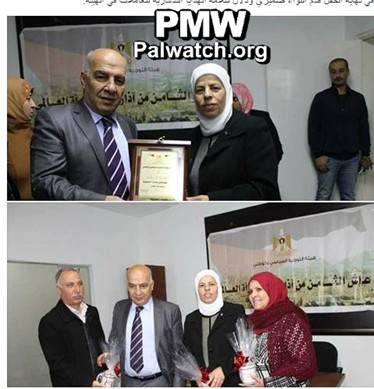 Posted text: “The [PLO] Political and National Guidance Authority honored its female employees for International Women’s Day, in a ceremony that it held in the presence of Fatah Movement Central Committee member [and Fatah Commissioner of NGOs] Dalal Salameh...
Posted text: “The [PLO] Political and National Guidance Authority honored its female employees for International Women’s Day, in a ceremony that it held in the presence of Fatah Movement Central Committee member [and Fatah Commissioner of NGOs] Dalal Salameh...General Political Commissioner [of the Political and National Guidance Authority] and official spokesman of the security establishment (i.e., the PA Security Forces) Adnan Al-Damiri presented Salameh with a plaque of appreciation.
In her speech for the event, Salameh said that the month of March is full of events connected to Palestinian women, including International Women’s Day. She mentioned Dalal Mughrabi (i.e., terrorist who led murder of 37, 12 of them children) - commander of the coast operation (i.e., the Coastal Road massacre), Mother’s Day, the Karameh [Battle] anniversary, the birthday of poet Mahmoud Darwish, and the eternal Land Day.”
[Facebook page of PA Security Forces Spokesman Adnan Al-Damiri,
March 14, 2017]
March 14, 2017]
Mahmoud Darwish is considered the Palestinian national poet. He published over 30 volumes of poetry and 8 books of prose and has won numerous awards. He joined the Israeli Communist Party in 1961 and the terrorist organization PLO, in 1973, becoming a member of the PLO Executive Committee in 1987. He left the PLO in 1993 because it signed the Oslo Accords with Israel.
Many in Israel see his poetry as inciting hate and violence. One poem he wrote in 1988 at the height of the Palestinian wave of violence and terror against Israel (the first Intifada, 1987-1993) calls to Israelis: “Take your portion of our blood - and be gone… Live wherever you like, but do not live among us… Die wherever you like, but do not die among us… Leave our country, our land, our sea, our wheat, our salt, our wounds, everything, and leave the memories of memory.”
He also wrote “Silence for the Sake of Gaza” in 1973, which many see as glorifying terror: “She wraps explosives around her waist and blows herself up. It is not a death, and not a suicide. It is Gaza's way of declaring she is worthy of life.”
His defenders have claimed that Israel misinterprets his poetry and that he sought reconciliation with Israel. One wrote in 2017: “Darwish arranged meetings between Palestinian and Israeli intellectuals, and published essays on their discussions. He was optimistic that, through mutual understanding, the two sides could eventually reconcile.” [https://www.bcalnoor.org/]
Many in Israel see his poetry as inciting hate and violence. One poem he wrote in 1988 at the height of the Palestinian wave of violence and terror against Israel (the first Intifada, 1987-1993) calls to Israelis: “Take your portion of our blood - and be gone… Live wherever you like, but do not live among us… Die wherever you like, but do not die among us… Leave our country, our land, our sea, our wheat, our salt, our wounds, everything, and leave the memories of memory.”
He also wrote “Silence for the Sake of Gaza” in 1973, which many see as glorifying terror: “She wraps explosives around her waist and blows herself up. It is not a death, and not a suicide. It is Gaza's way of declaring she is worthy of life.”
His defenders have claimed that Israel misinterprets his poetry and that he sought reconciliation with Israel. One wrote in 2017: “Darwish arranged meetings between Palestinian and Israeli intellectuals, and published essays on their discussions. He was optimistic that, through mutual understanding, the two sides could eventually reconcile.” [https://www.bcalnoor.org/]
“The Fatah branch in Bethlehem held a military parade today, Sunday [Jan. 1, 2017], on the 52nd anniversary of the outbreak of the Palestinian revolution and the Launch (Intilaqa) of the Fatah Movement.
Taking part in the military parade were the organizational branches, the student organizations, groups of masked people, and the Sisters of Dalal [committee of Fatah’s Shabiba student movement], who passed through the streets of the city...
Taking part in the reception of the military parade were several of the new members of the [Fatah] Movement Central Committee, heads of the [PA] Security Forces, secretaries of the organizational branches, and the official and popular institutions...
[Fatah] Movement Central Committee member ‘Abu Jihad’ [Mahmoud] Al-Aloul gave a speech in which he blessed the Palestinian people on the day of the Launch and Christmas, and emphasized the historic role of Fatah from the revolution until the PA and the building of the institutions of the future Palestinian state.”
[Ma’an, independent Palestinian news agency, Jan. 1, 2017]
Intilaqa- "the Launch" refers to the beginning of Fatah on Jan. 1, 1965, when it carried out its first terror attack against Israel, attempting to blow up Israel's National Water Carrier.
